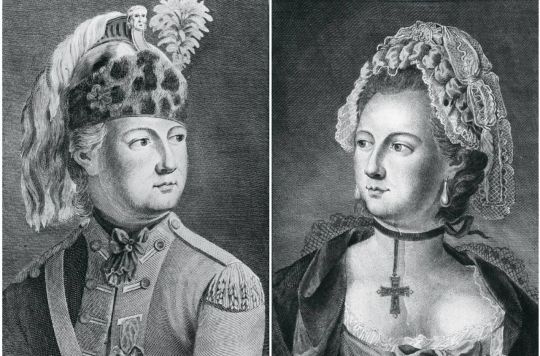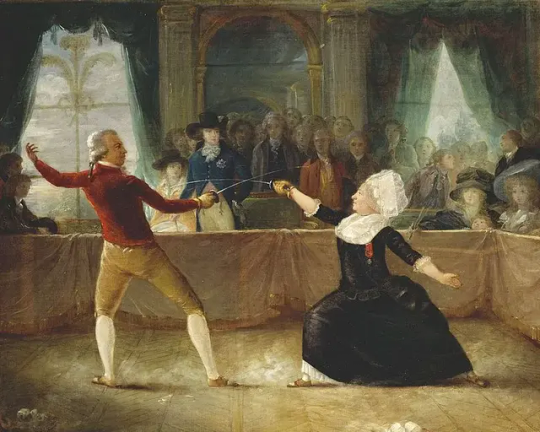#d'eon de beaumont
Explore tagged Tumblr posts
Text

KURO HAKUBUTSUKAN: GHOST AND LADY (2014-2015) by fujita kazuhiro
#kuro hakubutsukan: ghost and lady#the black museum: the ghost and the lady#kuro hakubutsukan#the black museum#the man in grey#d'eon de beaumont#florence nightingale#seinenedit#oldanimeedit#*nikki#words
11 notes
·
View notes
Text

How did these two become my favourite friendship?
56 notes
·
View notes
Text


5 notes
·
View notes
Text










My anime/manga list:
Le Chevalier D'Eon
#le chevalier d'eon#2000s anime#seinen#d'eon de beaumont#lia de beaumont#french history#drama#action#magic#fantasy#mystery#my anime and manga list
3 notes
·
View notes
Text
Lia de Beaumont, Mademoiselle d'Éon, a French-born aristocrat, became the subject of a huge wager in London in 1776, printed in the Westminster Gazette:
This gentleman declares the d'Eon (alias the Chevalier d'Eon) a WOMAN in the clearest sense of the word; this declaration he supports with a bet of any such sum of money from one to five thousand guineas, or he proposes to any one, who will deposit five thousand guineas in the hand of his banker, to pay £10,000 if d'Eon proves herself either a MAN and HERMAPHRODITE or any other animal other than a WOMAN.
"Normal Women: 900 Years of Making History" - Philippa Gregory
#book quotes#normal women#philippa gregory#nonfiction#lia de beaumont#chevalier d'eon#french#aristocrat#wager#london#70s#1770s#18th century#westminster gazette#hermaphrodite#intersex
17 notes
·
View notes
Text



Ph. La bouquiniste - "Mémoires du chevalier d'Eon, capitaine de dragons, chevalier de saint-Louis, ministre plénipotentiaire de France à la cour d'Angleterre" 2 Tomes
"S'ennuyant d'être la victime du monde et de la vanité,
cette incomparable beauté,
quitta par un effort sublime,
tous les biens que la terre estime,
pour acquérir l'éternité."
*
"Nu, du ciel je suis descendu, - Et nu je suis sous cette pierre. - Donc pour avoir vécu sur terre, - Je n'ai ni gagné ni perdu."
Charles de Beaumont dit Le Chevalier d'Eon
#la bouquiniste#livres#Mémoires du chevalier d'Eon#capitaine de dragons#chevalier de saint-Louis#ministre plénipotentiaire de France à la cour d'Angleterre#Charles de Beaumont
5 notes
·
View notes
Text


GIRLBOSS TOURNEY ROUND ONE: TWO WOMEN WHO LOOK GREAT IN ARMOR
Select which one you think is GIRLBOSSIER, i.e., which one is the better girlboss
Propaganda
Charlotte-Geneviève-Louise-Augusta-Andréa-Timothéa d'Éon de Beaumont (aka Chevalier d'Eon):
baddest trans bitch to ever spy
Samus:
First woman video game protagonist? hello??
#Charlotte-Geneviève-Louise-Augusta-Andréa-Timothéa d'Éon de Beaumont#Chevalier d'Eon#French History#samus aran#metroid#girlboss tourney#round one
8 notes
·
View notes
Text
I find it hilarious is when they say her alias was Madame de Beaumont because that’s just her name. Her full family name was d’Eon de Beaumont. This was also public information!
Honestly people trying to argue d’Eon was a cis man who only dressed as a woman as a disguise while working as a spy are so wrong it’s almost funny. She publicly transitioned! Everyone knew who she was. It’s not a good secret identity if it’s in all the papers.
27 notes
·
View notes
Text







Character inspirations: Stellaris🌟, Damien🏰, Laurent🌿, Béatrice🎀Abel ⚜️, Céleste 💫 and Lunette🌙
Stellaris inspirations: Cecil Harvey (FFIV) Garnet til Alexandros (FFIX) Odette (Barbie Swan Lake) Erika (Barbie Princess and Pauper) Stella (Winx Club) Elizabeth (Shinyaku Märchen)
Damien inspirations: Vayne Carudas Solidor (FFXII) Valtor (Winx Club) Vincent (Silent Hill 3) Frollo (Hunchback of Notredame) Preminger (Barbie Princess and Pauper) Hypnos (Saint Seiya Lost Canvas)
Laurent inspirations: Harry Mason (Silent Hill) Julian (Barbie Princess and Pauper) Phillip (Sleeping Beauty) Edward Chris von Muir (FFIV) Aries Shion (Saint Seiya Lost Canvas) D'Eon de Beaumont (Le Chevalier D'Eon anime)
Béatrice inspirations: Aerith Gainsborough (FFVII) Aurora (Sleeping Beauty) Vanessa (Winx Club) Maya Amano (Persona 2) Sasha (Saint Seiya Lost Canvas) Lisa Tepes (Castlevania)
Abel inspirations: Nier (brother) (NieR Replicant) Dante Sparda (Devil May Cry) Pisces Albafica (Saint Seiya Lost Canvas) Squall Leonhart (FFVIII) Helia (Winx Club) Ceodore Harvey (FFIV TAY)
Céleste inspirations: Lara Croft (Tomb Raider) Mitsuru Kirijo (Persona 3) Yuzuriha (Saint Seiya Lost Canvas) Yuna (FFX-2) Rina Toin (MMPPP) Saya Otonashi (Blood +
Lunette inspirations: Fuuka Yamagishi (Persona 3) Maria Robotnik (Sonic) Sophie (Howl's Moving Castle) Nene Yashiro (Toilet Bound Hanako-kun) Chise Hatori (The Ancient Magus Bride) Belle (Belle movie)
#stellaris poses#stellaris lore#stellaris mikail#damien forestier#laurent forestier#béatrice forestier#abel varlineau#céleste varlineau#lunette varlineau
2 notes
·
View notes
Text
Chevalier d'Eon, the First Trans Aristocrat
Read the latest LOST IN HISTORY post on the Chevalier d'Eon
The French Chevalier d’Eon as a woman When the Chevalier d’Eon left France in 1762, he was a diplomat, a spy, a Dragoon captain, and a man. When she returned in 1777, at the age of 49, she was a celebrity, a writer, a fencer, and a woman—by declaration by the government of France. Chevalier d’Eon was born Charles d’Eon de Beaumont, and in mid-life changed genders to a woman, Charlotte. d’Eon’s…

View On WordPress
3 notes
·
View notes
Text

Charles-Geneviève, Chevalier d'Eon de Beaumont/Mademoiselle d'Eon, espion.ne de Louis XV.


#trans#genderfluid#gender fuckery#upthebaguette#french side of tumblr#18th century#spy#louis XV#chevalier d'éon
7 notes
·
View notes
Note
our girl chevaliere d'eon was historically a transgender woman. her trans swag is unmatched -- nobody else blackmailed a king to be recognized as her chosen gender AND made the royal treasury pay for her new wardrobe. vote charlotte-genevive-louise-auguste-andre-timothee d'eon de beaumont.
She is an icon!!!!!!!
6 notes
·
View notes
Text

5 notes
·
View notes
Text
The Chevalier d'Éon (1728-1810) was raised in France as the male heir to the Beaumont family. The decorated soldier dressed as a man to serve as a captain of Dragoons, and as a woman named Lia de Beaumont to spy for France on Russia and England. A master fencer, the Chevalier is shown here on the right in a celebrated match against Chevalier de St Georges. This was painted by Alexandre-Auguste Robineau c.1787.

"Normal Women: 900 Years of Making History" - Philippa Gregory
#book quotes#normal women#philippa gregory#nonfiction#chevalier d'eon#france#beaumont#soldier#dragoons#captain#lia de beaumont#spy#russia#england#fencing#chevalier de saint georges#alexandre auguste robineau#80s#1780s#18th century
10 notes
·
View notes
Text
Jour 03.
Charles d'Eon de Beaumont, Chevalier d'Eon.
Agent secret, iel est connu pour avoir porté des tenues aussi bien féminines que masculines.
Iel vivra sa fin de sa vie sous une identité de femme, à la grande surprise de sa compagne de logement !
instagram
0 notes